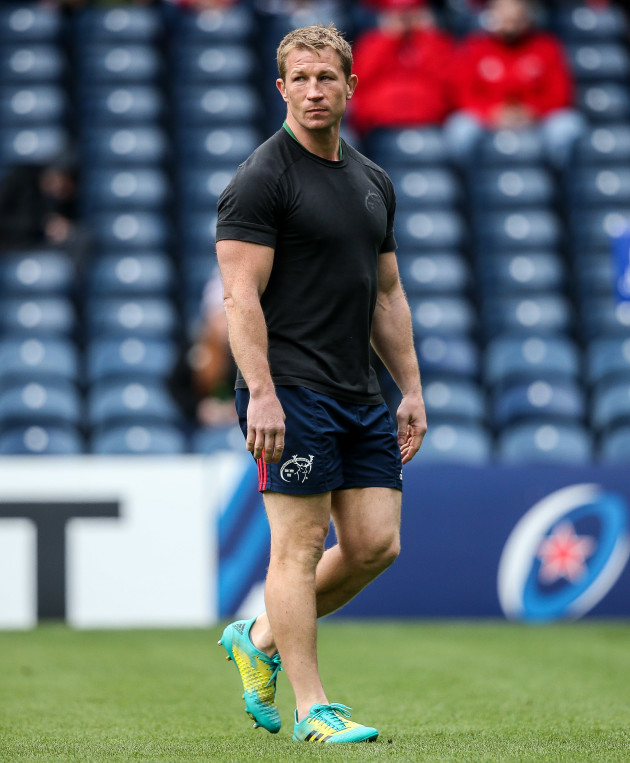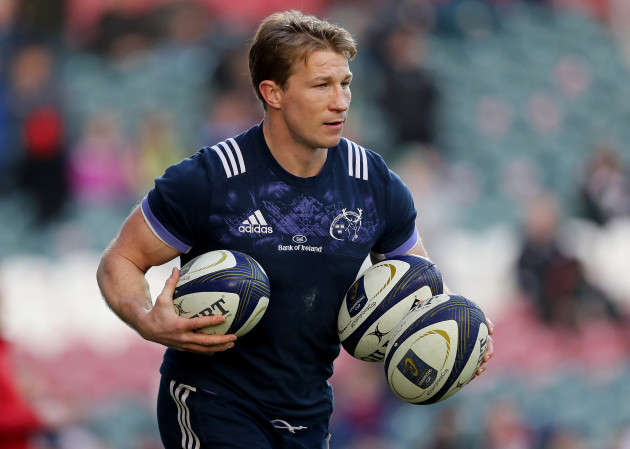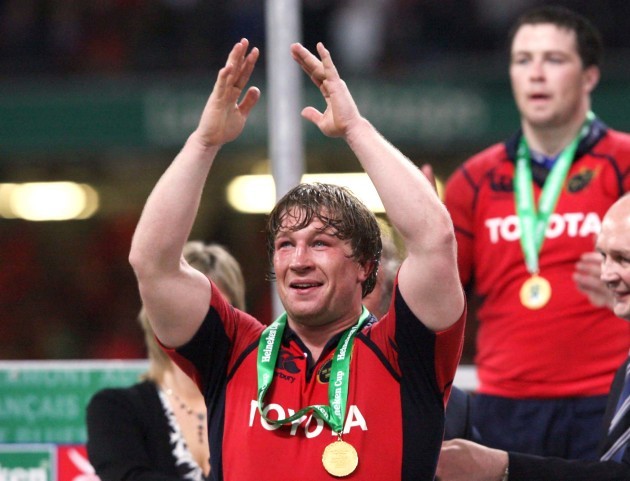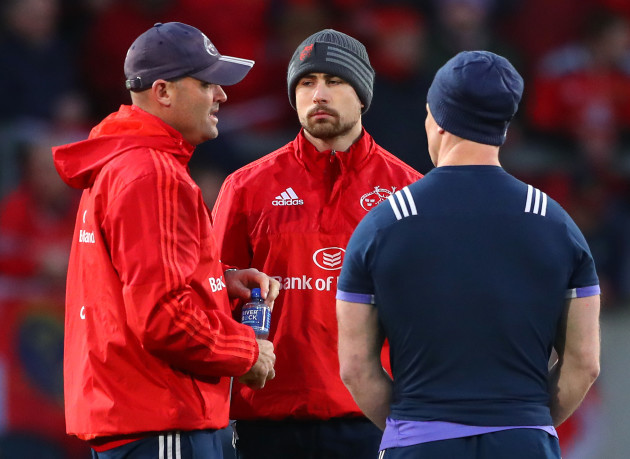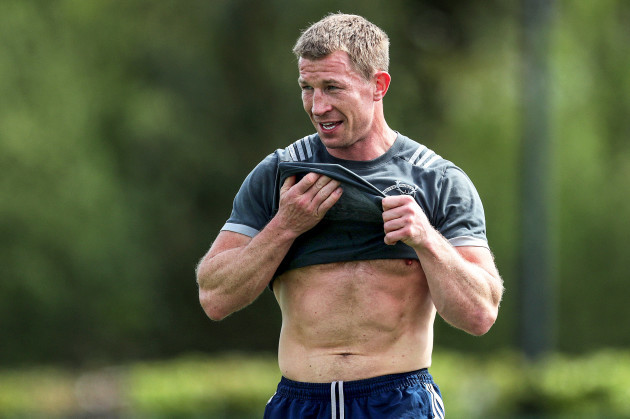JERRY FLANNERY WAS busy yesterday with Harlequins’ Premiership clash against Bath but his weekend would have started on Friday night by tuning into Munster’s meeting with Leinster in the Pro14 semi-finals.
Flannery, like every other Munster person, won’t have enjoyed what he watched.
The 41-year-old Limerick man has spent more than 16 years of his life so far as a player or coach with his home province, investing blood, sweat, tears, and endless hours of work into trying to make them successful. You don’t just switch off that connection.
He left his role as Munster forwards coach at the end of the 2018/19 season, turning down a new contract offer as he and Felix Jones opted to move on, but after a year out of the professional game, Flannery is back as lineout coach with Paul Gustard’s Quins.
During the break, Flannery kept his eye in by taking sessions with underage teams in St. Munchin’s, Castletroy College, Shannon, and UL Bohs and found the experiences valuable - ”it was something I hadn’t done before, you start breaking skills down and seeing progressions” – but the pro game was calling.
Media work meant Flannery had to keep on top of events and yet he found himself poring over footage of every game he could get his hands on in detail, to the extent that his wife, Katy, “was asking me why I was always watching games when I wasn’t involved.”
So when his agent got in touch during lockdown to say Harlequins were looking to add another coach, his interest was piqued. Flannery found himself on the same wavelength as Gustard over several in-depth Zoom conversations and soon signed on the dotted line, moving to England with his family in June.
So why did Flannery leave Munster when there was the option of extending his contract?
“I loved coaching with Munster,” he answers. “I just felt the time was right to move on.
“If you look at it, we’d been to three successive European semi-finals and people were asking when we would kick on and win something.
“I was thinking – whether it’s right or wrong – that the standard to win a European Cup is eight or nine regular starting internationals in your team. We had four during my period there – Conor Murray, Keith Earls, Peter O’Mahony, and CJ Stander.
“We were getting to semi-finals and I’m not joking you, man, I care about Munster so much. Felix and I were killing ourselves working so hard and I know that doesn’t mean that you deserve anything, but we were working so hard to get there, and then we’d get a lot of criticism for not getting beyond a semi-final.
“I just went, ‘I don’t know where I can go from here’ and the timing was right to move on. I didn’t have anything lined up, it was like jumping out of a plane without a parachute. There was support for us internally in Munster but three semi-finals…
“There was quite a lot of pressure. If it doesn’t feel right, I’ve gotten so much out of Munster, I just thought ‘maybe someone else can take this further than I can.’”
Flannery adds that with the signings of Damian de Allende and RG Snyman, as well as Andrew Conway’s progress with Ireland, he feels that a fully-fit Munster squad now is closer to the quality required.
“Before, I thought we were deficient in the top-level players required to win but now they’re there.”
It hurt Flannery to walk away but he’s thankful for what he learned during his time in Munster – including how work ethic was a minimum requirement.
“If you weren’t a hard worker in Munster during my time as a player and coach, you were an outlier so people tended to fall in.
“I played above my ability as a player because I played with so many guys who set high standards and demanded a lot out of you. It helped a player like me, who was pretty average, to achieve quite a lot out of the game.”
As Flannery won two Heineken Cups and two Celtic Leagues with Munster, being a coach was never part of the plan. He wasn’t the kind of player who tactically worked his way through games, understanding how everyone fit into the jigsaw.
“I just focused purely on my own game. You have different types of leadership – some people are tactical leaders, someone like Tyler Bleyendaal or Billy Holland. Someone like CJ Stander is a motivational leader out on the field, where the players feel confident because they know CJ will do what he said he’s going to do.
“You’ve got social leaders like Dave Kilcoyne, he brings the group together, he’s the social glue. Then you have people who are externally very good at respresenting the club, like Peter O’Mahony.
“I would have fallen in around the motivational side of things. I would have trained hard and wanted the lads around me to see that they could trust me on the field.
“To be honest, it was a really steep learning curve for me going into coaching. If you’re a lineout caller, you have to be aware of everyone else’s role within the lineout. If you’re a 10, you need to understand everyone’s roles within the maps you’re going to run.
“But when you’re a hooker, at times, it’s more about the timing of things that are specific to you. So I had to take a much bigger-picture view of rugby when I went into coaching. It was a steep learning curve but I was lucky with the coaches I worked with in those early days.”
It was his late friend Anthony Foley who brought Flannery into the mix in 2014 after the former Ireland hooker had earned a master’s degree in sports performance and then worked in Premier League club Arsenal’s strength and conditioning department.
Starting off as a scrum coach with Munster, Flannery admits to having had doubts about his own qualifications, constantly wondering, “Am I doing anything right here?” and second-guessing himself.
By 2017, he had been promoted to forwards coach and says the five turbulent years he spent in Munster’s coaching staff saw his confidence grow.
“I definitely improved in terms of being comfortable in my own skin as a coach. As a player, you came in and the coaches often offered up the answers,” explains Flannery.
“I initially probably went in there thinking I had to have all the answers when I didn’t. You never have all the answers – if someone says they do, they’re telling lies.
“It took me time to feel more confident and be able to stand in front of the group and say, ‘I’m not sure what we should do here, what do you think lads?’ and you bring the group together and you problem-solve so much better as a group rather than one guy just telling everyone what to do. There’s a time for that but it’s not sustainable.”
Flannery says he learned huge amounts from Foley, while Rassie Erasmus and Jacques Nienaber had a major influence on him before they departed back to South Africa, opening the door for Johann Van Graan to take over.
“Jacques’ work ethic is second to none and seeing how Rassie manages people is just phenomenal,” says Flannery. “Johann came in and showed me a different way of doing things because I was in the mindset that Rassie’s way was the right way to do it.
“Rassie keeps his distance from the players but Johann would be about trying to be very close to specific players. There’s no right or wrong, so I learned a lot.”
Having been part of the collective doubts over how Munster tactically approached the game in Rassie’s time in charge of the province, Flannery was elated to watch on as the Springboks won the World Cup last year, with Felix Jones part of the set-up too.
“To see Felix, Rassie, and Jacques going on to win the World Cup gave me a lot of… I suppose affirmation, if you know what I mean.
“Because when you’re trying to get somewhere, you always have that doubt about whether you’re doing the right thing. To see their success – not that I’m on any level with them – but I saw that the way they had shown me works.”
While that trio will hope to pick up where they left off whenever the Boks get back into action, Flannery certainly has his hands full in Harlequins, who lost to Bath yesterday as their up-and-down restart of the 2019/20 Premiership continued.
The hectic schedule, which involves midweek games, means everyone is struggling for consistency amidst squad rotation but Flannery and the Quins staff have a longer-term project of putting in place a culture that produces an ability to perform every time.
“There are good players everywhere, so it’s about the culture being right so people do all of the small things that don’t get the external praise, things that they’re doing things for the team that make everyone better.
“That takes time but as long as you have a cohort who associate themselves with Harlequins and want to make this the best Harlequins team we can be, then you’re in the mix.”
In that sense, Flannery looks with admiration at Leinster, where he feels Leo Cullen is “trying to build something that’s going to be there for a lot longer than he’s going to be there for. Leo genuinely really, really cares for Leinster.”
Flannery’s title with Quins is ‘lineout coach’ but he works closely with scrum coach Adam Jones, the former Wales tighthead, on the breakdown and scrum as well.
“It’s very different to coaching in Ireland, you have a lot more of a mix of people there to build relationships with,” he says of his new gig. “In Munster, people might have known me from being there as a player or they got to know me over time.
“The biggest thing as a coach is trying to build a relationship with the players, to be consistent with them, and that’s when they start to trust you and you get the best out of them.”
Katy’s family are from Guildford so that has helped the Flannery’s settle in quickly, as well as ensuring that there is family support as Jerry gets stuck into the demanding hours of coaching once again.
He stresses the importance of maintaining a work/life balance and making sure he sees plenty of his sons, three-year-old Ezra and four-year-old Eli, as he highlights how “coaching is a really selfish profession, so it’s on me to get that right.”
But now that he’s back in the game, Flannery is revelling in it all and says that a future head coaching role would appeal – even if he understands that rugby is an uncertain beast.
“If the opportunity comes up, I would definitely like to be involved as a head coach. I appreciate how hard it is, a very lonely job, and the most important thing is that there’s 100% trust in the coaching team.
“A season has ups and downs – shit, with Munster we had plenty of them – but the coaching group being tight is important. I’ve been very lucky in the coaching groups I’ve worked with. It’s something I’d like to do down the line but you just can’t plan these things.
“When I went down chatting to ROG in New Zealand, he told me he had just ended up in Racing, ended up in Crusaders, and now he’s in La Rochelle. You can work your ass off coaching, working really hard, but you just don’t know what’s ahead.”
